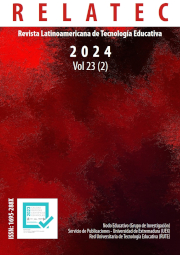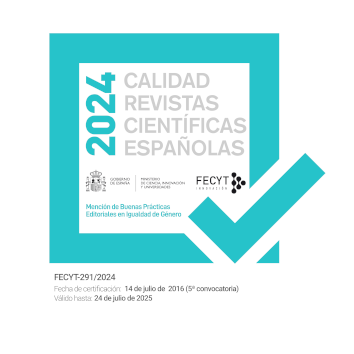Educação Inclusiva com Jogos Sérios e Design Centrado no Utilizador, explorando a intersecção entre acessibilidade e usabilidade.
DOI:
https://doi.org/10.17398/1695-288X.23.2.27Palavras-chave:
Acessibilidade, Usabilidade, Jogos educativos, Tecnologia educacional, Educação especialResumo
O avanço da tecnologia possibilita novos recursos para a educação. A convergência da acessibilidade, usabilidade, jogos sérios (JS) e design centrado no usuário (DCU) possibilita o desenvolvimento de recursos inclusivos para atender às necessidades das pessoas com deficiência. Este trabalho tem como objetivo analisar e sintetizar os desenvolvimentos de jogos educativos digitais, focando nos aspectos técnicos que facilitem sua implementação em sala de aula. Foram aplicados os critérios e recomendações do protocolo PRISMA (2020) para realizar a pesquisa. Foram utilizadas palavras-chave para explorar as bases de dados Web of Science, Scopus, PubMed e em 21 revistas, cobrindo o período de 2018 a 2023. Na pesquisa inicial, foram identificados 799 artigos, e após o processo de depuração, foram analisadas 24 publicações. Os resultados indicam um interesse crescente e contínuo na temática. Foram identificadas as tendências atuais no design e uso de jogos acessíveis para pessoas com deficiência intelectual, bem como seu impacto na aprendizagem e inclusão educacional.
Downloads
Referências
Alvarado-Cando, O., Belén Jara, G., Barzallo, P., & Torres-Salamea, H. (2019). A Software Based on Eye Gaze to Evaluate Mathematics in Children with Cerebral Palsy in Inclusive Education. En T. Z. Ahram & C. Falcão (Eds.), Advances in Usability, User Experience and Assistive Technology (Vol. 794, pp. 909-915). Springer International Publishing. https://doi.org/10.1007/978-3-319-94947-5_89
Alvarez, J., Rampnoux, O., Jessel Jean, P., & Méthel, G. (2007). Serious Game: Just a question of posture? https://www.researchgate.net/publication/260517048_Serious_Game_just_a_question_of_posture
Atanga, C., Jones, B. A., Krueger, L. E., & Lu, S. (2020). Teachers of Students With Learning Disabilities: Assistive Technology Knowledge, Perceptions, Interests, and Barriers. Journal of Special Education Technology, 35(4), 236-248. https://doi.org/10.1177/0162643419864858
Ben Itzhak, N., Franki, I., Jansen, B., Kostkova, K., Wagemans, J., & Ortibus, E. (2022). An individualized and adaptive game-based therapy for cerebral visual impairment: Design, development, and evaluation. International Journal of Child-Computer Interaction, 31, 100437. https://doi.org/10.1016/j.ijcci.2021.100437
Ben Itzhak, N., Franki, I., Jansen, B., Kostkova, K., Wagemans, J., & Ortibus, E. (2023). Usability and user experience of an individualized and adaptive game-based therapy for children with cerebral visual impairment. International Journal of Child-Computer Interaction, 35, 100551. https://doi.org/10.1016/j.ijcci.2022.100551
Bossavit, B., & Parsons, S. (2018). Outcomes for design and learning when teenagers with autism codesign a serious game: A pilot study. Journal of Computer Assisted Learning, 34(3), 293-305. https://doi.org/10.1111/jcal.12242
Bui, P., Rodríguez-Aflecht, G., Brezovszky, B., Hannula-Sormunen, M. M., Laato, S., & Lehtinen, E. (2020). Understanding students’ game experiences throughout the developmental process of the number navigation game. Educational Technology Research and Development, 68(5), 2395-2421. https://doi.org/10.1007/s11423-020-09755-8
Carrión Toro, M. del C. (2022). iPlus una Metodología Centrada en el Usuario para el Diseño de Juegos Serios. Escuela Politecnica Nacional (Ecuador).
Carrión-Toro, M., Santorum, M., Acosta-Vargas, P., Aguilar, J., & Pérez, M. (2020). iPlus a User-Centered Methodology for Serious Games Design. Applied Sciences, 10(24), 9007. https://doi.org/10.3390/app10249007
Chrisyarani, D. D., Yasa, A. D., Hakim, A. R., & Putra, F. M. (2021). Interactive educational games assisted Construc 2: A systematic perspective of design reviews. IOP Conference Series: Materials Science and Engineering, 1098(3), 032107. https://doi.org/10.1088/1757-899X/1098/3/032107
Dash, A. K., Behera, S. K., & Dogra, D. P. (2023). PlutoAR: A scalable marker-based augmented reality application for interactive and inclusive education. Multimedia Tools and Applications. https://doi.org/10.1007/s11042-023-17756-x
De Souza, S. R., Gris, G., Gamba, J., F. Da Rocha, M. L., & Dos Santos Carmo, J. (2023). Adapted digital domino game: Teaching multiplication to children. CES Psicología, 16(2), 46-61. https://doi.org/10.21615/cesp.6473
Fetaji, M., Kajtazi, E., Fetaji, B., Snopce, H., & Apostolova, M. (2020). Assessing the Impact of Mobile Educational Games on Student’s Success within Mathematics Subject in Primary Schools. 2020 43rd International Convention on Information, Communication and Electronic Technology (MIPRO), 878-881. https://doi.org/10.23919/MIPRO48935.2020.9245150
Holmgren, M. (2023). Enacting Special Education in a Digitalized School: Opening for New Understandings of a Digitalized Special Educational Practice. Journal of Special Education Technology, 38(4), 488-500. https://doi.org/10.1177/01626434221131776
Jeblaoui, O., Khenissi, M. A., Essalmi, F., & Chang, M. (2019). Modelling the Learner’s Values with Computer-based Educational Game. 2019 7th International Conference on ICT & Accessibility (ICTA), 1-6. https://doi.org/10.1109/ICTA49490.2019.9144851
Kaimara, P. (2023). Digital Transformation Stands Alongside Inclusive Education: Lessons Learned from a Project Called “Waking Up in the Morning”. Technology, Knowledge and Learning. https://doi.org/10.1007/s10758-023-09667-5
Kamarulzaman, N. S. B., Phon, D. N. E., & Baharuddin, M. S. (2021). A Mathematical Educational Game Application for Primary School Slow Learner. 2021 International Conference on Software Engineering & Computer Systems and 4th International Conference on Computational Science and Information Management (ICSECS-ICOCSIM), 348-353. https://doi.org/10.1109/ICSECS52883.2021.00070
Keselj, A., Topolovac, I., Kacic-Barisic, M., Burum, M., & Car, Z. (2021). Design and Evaluation of an Accessible Mobile AR Application for Learning About Geometry. 2021 16th International Conference on Telecommunications (ConTEL), 49-53. https://doi.org/10.23919/ConTEL52528.2021.9495975
Krüger, N., McCallum, A., & Volman, V. (2022). Dimensión federal de la segregación escolar por nivel socioeconómico en Argentina. Perfiles Educativos, 44(176). https://doi.org/10.22201/iisue.24486167e.2022.176.60281
Maldonado Valera, C., Marinho, M. L., & Robles, C. (2020). Inclusión y cohesión social en el marco de la Agenda 2030 para el Desarrollo Sostenible: Claves para un desarrollo social inclusivo en América Latina. CEPAL -Naciones Unidas.
Maqsood, S., Mekhail, C., & Chiasson, S. (2018). A day in the life of jos: A web-based game to increase children’s digital literacy. Proceedings of the 17th ACM Conference on Interaction Design and Children, 241-252. https://doi.org/10.1145/3202185.3202753
Marín, V. I. (2022). La revisión sistemática en la investigación en Tecnología Educativa: Observaciones y consejos. Revista Interuniversitaria de Investigación en Tecnología Educativa, 62-79. https://doi.org/10.6018/riite.533231
Nagalingam, V., Ibrahim, R., & Che, R. (2020). EDUGXQ: User Experience Instrument for Educational Games’ Evaluation. International Journal of Advanced Computer Science and Applications, 11(1). https://doi.org/10.14569/IJACSA.2020.0110170
Ocampo-Pazos, W., Garc a-Abad, J., Macas-Macias, A., Carrasco-Ramirez, F., & Centeno-Lara, J. L. (2020). Videojuego Educativo para el pensamiento lógico-matemático en educación básica: Revisión sistemática de literatura. Revista Ibérica de Sistemas e Tecnologias de Informação, E31, 513-531.
Ouzzani, M., Hammady, H., Fedorowicz, Z., & Elmagarmid, A. (2016). Rayyan—A web and mobile app for systematic reviews. Systematic Reviews, 5(1), 210. https://doi.org/10.1186/s13643-016-0384-4
Own, C.-M., Cai, T., & Hung, C.-Y. (2023). Exploring the Potential of Tangible and Multitouch Interfaces to Promote Learning Among Preschool Children. IEEE Transactions on Learning Technologies, 16(1), 66-77. https://doi.org/10.1109/TLT.2022.3170031
Page, M. J., McKenzie, J. E., Bossuyt, P. M., Boutron, I., Hoffmann, T. C., Mulrow, C. D., Shamseer, L., Tetzlaff, J. M., Akl, E. A., Brennan, S. E., Chou, R., Glanville, J., Grimshaw, J. M., Hróbjartsson, A., Lalu, M. M., Li, T., Loder, E. W., Mayo-Wilson, E., McDonald, S., … Moher, D. (2021). The PRISMA 2020 statement: An updated guideline for reporting systematic reviews. International Journal of Surgery, 88, 105906. https://doi.org/10.1016/j.ijsu.2021.105906
Pinto, M. F. (2020). Pobreza y educación: Desafíos y pólíticas (Documento de Trabajo, No. 265). Universidad Nacional de La Plata Centro de Estudios Distributivos, Laborales y Sociales (CEDLAS), Universidad Nacional de La Plata.
Reed, D. K., Martin, E., Hazeltine, E., & McMurray, B. (2020). Students’ Perceptions of a Gamified Reading Assessment. Journal of Special Education Technology, 35(4), 191-203. https://doi.org/10.1177/0162643419856272
Rodriguez-Ascaso, A., Letón, E., Muñoz-Carenas, J., & Finat, C. (2018). Accessible mathematics videos for non-disabled students in primary education. PLOS ONE, 13(11), e0208117. https://doi.org/10.1371/journal.pone.0208117
Sánchez-Meca, J. (2022). Revisiones sistemáticas y meta-análisis en Educación: Un tutorial. Revista Interuniversitaria de Investigación en Tecnología Educativa, 5-40. https://doi.org/10.6018/riite.545451
Silva Sández, G., & Rodríguez Miranda, F. D. P. (2018). Una mirada hacia las TIC en la educación de las personas con discapacidad y con trastorno del espectro autista: Análisis temático y bibliográfico. EDMETIC, 7(1), 43-65. https://doi.org/10.21071/edmetic.v7i1.10030
Stancin, K., & Hoic-Bozic, N. (2021). The Importance of Using Digital Games for Educational Purposes for Students with Intellectual Disabilities. 8-13. https://ceur-ws.org/Vol-2861/invited_paper_1.pdf
Tsikinas, S., & Xinogalos, S. (2020). Towards a serious games design framework for people with intellectual disability or autism spectrum disorder. Education and Information Technologies, 25(4), 3405-3423. https://doi.org/10.1007/s10639-020-10124-4
United Nations Department of Economic and Social Affairs. (2023). Informe de los Objetivos de Desarrollo Sostenible 2023: Edición especial. United Nations. https://doi.org/10.18356/9789210024938
Vee Senap, N. M., & Ibrahim, R. (2019). A Review of Heuristics Evaluation Component for Mobile Educational Games. Procedia Computer Science, 161, 1028-1035. https://doi.org/10.1016/j.procs.2019.11.213
Veldkamp, A., Rebecca Niese, J., Heuvelmans, M., Knippels, M. P. J., & Van Joolingen, W. R. (2022). You escaped! How did you learn during gameplay? British Journal of Educational Technology, 53(5), 1430-1458. https://doi.org/10.1111/bjet.13194
Volioti, C., Orovas, C., Sapounidis, T., Trachanas, G., & Keramopoulos, E. (2023). Augmented Reality in Primary Education: An Active Learning Approach in Mathematics. Computers, 12(10), 207. https://doi.org/10.3390/computers12100207
Von Gillern, S., & Nash, B. (2023). Accessibility in video gaming: An overview and implications for English language arts education. Journal of Adolescent & Adult Literacy, 66(6), 382-390. https://doi.org/10.1002/jaal.1284
Xiong, Z., Liu, Q., & Huang, X. (2022). The influence of digital educational games on preschool Children’s creative thinking. Computers & Education, 189, 104578. https://doi.org/10.1016/j.compedu.2022.104578
Yabut, E. R., Jamis, M. N., Manuel, R. E., & Fabito, B. S. (2019). Empowering Elementary Schools on Learning Math: A Development of Gamified Educational Mobile Application for Grade 3 Students. 2019 IEEE 11th International Conference on Humanoid, Nanotechnology, Information Technology, Communication and Control, Environment, and Management (HNICEM ), 1-5. https://doi.org/10.1109/HNICEM48295.2019.9073428
Downloads
Publicado
Edição
Secção
Licença
Direitos de Autor (c) 2024 Claudia Screpnik, Francisca Negre-Bennasar, Jesús Salinas

Este trabalho encontra-se publicado com a Licença Internacional Creative Commons Atribuição-NãoComercial-SemDerivações 4.0.
Los autores/as que publiquen en esta revista aceptan las siguientes condiciones:
1. Los autores/as conservan los derechos de autor y ceden a la revista el derecho de la primera publicación, con el trabajo registrado con la licencia Creative Commons Reconocimiento-NoComercial-SinObraDerivada 4.0 International (CC BY-NC-ND), que permite a terceros utilizar lo publicado siempre que mencionen la autoría del trabajo y a la primera publicación en esta revista.
2. Los autores/as pueden realizar otros acuerdos contractuales independientes y adicionales para la distribución no exclusiva de la versión del artículo publicado en esta revista (p. ej., incluirlo en un repositorio institucional o publicarlo en un libro) siempre que indiquen claramente que el trabajo se publicó por primera vez en esta revista.
3. Se permite y recomienda a los autores/as a publicar su trabajo en Internet (por ejemplo en páginas institucionales o personales) antes y durante el proceso de revisión y publicación, ya que puede conducir a intercambios productivos y a una mayor y más rápida difusión del trabajo publicado (vea The Effect of Open Access).









